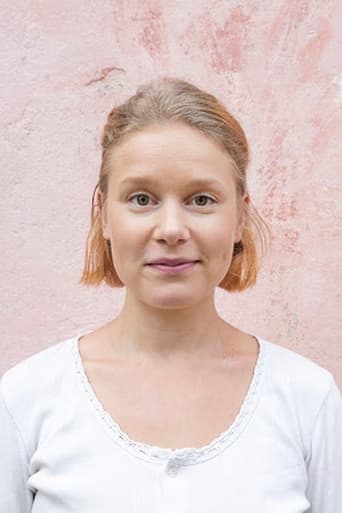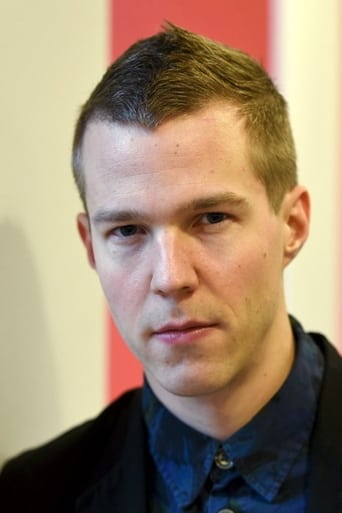Lovesusti
The Worst Film Ever
Afouotos
Although it has its amusing moments, in eneral the plot does not convince.
TaryBiggBall
It was OK. I don't see why everyone loves it so much. It wasn't very smart or deep or well-directed.
Isbel
A terrific literary drama and character piece that shows how the process of creating art can be seen differently by those doing it and those looking at it from the outside.
damittaja
I didn't think this movie would be any good but it surprised me. When I started watching it I expected it would again be one of those "boo-hoo life is so cruel" type of movies. However, the movie is quite cheerful in nature and does not try to condemn people with attitudes and views that differ from the norms. It just presents them with a touch of humor. The locations for the events are interesting and realistic.Of the actors I especially liked Maristo. She fit her role perfectly as a young woman who goes out to the world to discover how it is instead of just basing her opinions on what her parents say and tell to think. I liked how all the characters were flawed in a way or another like how it is in real life. I also liked how the movie portrayed love and the painful process that is finding one's way to love. There were some famous actors in side roles and it's good that they've been left there because I dislike them in general.The budget for this movie might not have been a large one but I enjoyed watching it and that is the most important part. You don't need to be a Finn to watch the movie (though, understanding the language is a bonus) as the theme could very well be transferred to other cultures.
random_avenger
Dome Karukoski can be called one of the most prominent Finnish film directors right now, having achieved success among both the public and popular critics with all of his films so far. Following the hip hop-flavoured romance Beauty and the Bastard (2005) and the serious drama The Home of Dark Butterflies (2008), Karukoski's third feature film Forbidden Fruit examines common themes of finding one's place in the world when leaving one's home for the first time.The teenaged Maria and Raakel (Amanda Pilke and Marjut Maristo) are two best friends who have grown up in Conservative Laestadian families in Ostrobothnia, Finland and are strong in their faith. However, Maria is turning from a girl to a woman and longs to see more in life than what the basically loving but highly patronizing Christian community can offer. Having turned 18, she moves to Helsinki and starts experimenting with various temptations the big city has to offer. Concerned for her safety and redemption, the community leaders send her friend Raakel to look after her and hopefully to convince her to return to her roots. After initial reservations, the city life starts tempting Raakel too, especially after she meets a nice cinephile boy named Toni (Joel Mäkinen).At first the premise sounds terribly old-fashioned, like a cautionary tale about the hazards of sinful cities straight from the 1950s. Luckily the idea of the movie is not to contrast the conservative country life to wild urban partying; the opposing environments provide only the backdrop for personal development of Maria and Raakel. Many viewers can probably identify with the girls' budding feelings of sexuality and sense of freedom even if such themes are not anything groundbreakingly new in the youth film genre. An extra twist is provided by the girls' connection through faith and the effect their strict upbringing has left on their view of life: under the fun-loving surface Maria has a fearful heart, unlike Raakel who has never dared to even think about rebellion until tasting it personally.The film does not overtly criticize the conservative Laestadian movement even if the members' narrow-minded views about things like contraception, television, pop music, make-up and young people's relationships are at odds with mainstream opinions. It cannot really be seen as sympathizing with the movement either; the social shunning of former members like Maria's sister Eeva (Malla Malmivaara) is not exactly something a truly loving person would do. The storyline of the hard-drinking, promiscuous Eeva is among the weaker aspects of the plot anyway, I think it has been left feeling somewhat unfinished and heavy-handed compared to the mostly balanced tone. On the other hand, it adds to the spectrum of possible fates people may get after leaving the movement: some decide to stay away and feel better than ever, some realize the old-fashioned lifestyle is the best for them after all while others never really find out what would be good for them (much like Eeva in the film). In a way Eeva's emotional problems could be seen as stemming from the conservative movement's influence, but she might as well be unstable by nature, so it is left up for the viewer to decide if her character should be understood as criticism towards strict conservatism or not.Visually Forbidden Fruit is real eye-candy. The rich colours of the cinematography by Tuomo Hutri marvelously capture the beauty of both urban and rural environments and Karukoski's direction flows forward effortlessly. The young protagonists Pilke and Maristo do their parts well even if they constantly look too young to be even allowed in bars, but I guess that's how a lot of young adults look these days (I also still tend to see Pilke primarily as the shy little singer girl from Perttu Leppä's hilarious 2003 comedy Pearls and Pigs). In summary, Forbidden Fruit is a very satisfactory portrayal of the shaping of one's identity at the tender age between childhood and adulthood. The Christian background can be generalized to symbolize any safe home from which young people have to eventually leave to face the "dangerous" world on their own, so in the end the overhanging themes of the story are universal for people in or outside of any religion. Of the three Karukoski films I have seen at the time of writing this, I would call Fruit the best.
kathik
This surprising film introduces us to a contemporary, conservative Lutheran sect with over 100,000 members in Finland through the lives of two 18-year old girls of the sect, one of whom rebels against her religion's taboos (no TV, no dancing, no make-up, no alcohol, no sex before marriage and no kissing before marriage) by leaving her village in northern Finland to visit the "evil" big city Helsinki and experience "life." The second 18-year old girl is sent by church elders to follow the rebel, watch over her, and keep her from falling into sin and ending up in eternal hell.Now we have a situation that promises to bring about something of interest, and it does. The story continues with the familiar inner conflict of desiring forbidden experiences and how each individual reacts to the big city's temptations. Not to give away the story further, I'll just say the two girls in question are easy on the eyes and the director certainly knows it. My only criticism might be the understandable yet slightly too frequent lingering on the faces of these lovely girls, but this is certainly a minor criticism.I highly recommend this beautifully done film!
Nagi4
This was surprise for me. I saw it in Karlovy Vary film festival, and It was one of the biggest highlights of the festival. Came out of the blue. I had heard the directors name mentioned before, but I didn't expect such mature directing.I had to even dig out some more information of these Apostolic Lutherans /Conservative Laestadians and found out that the film had brought up a lot of discussion in the Finnish media.The film it self has a very strong visual style. Camera is very close to the main actors, and you can really feel with them.I thought that the actors were doing a fantastic job in every aspect and the characters were so innocent and moving. This old fart could really relate to them.As for ratings. I thought it was almost a ten for me, but some of the oddities in the script made it a nine. How ever I could live through these problems, because the feeling in the film was so strong. Good work!






